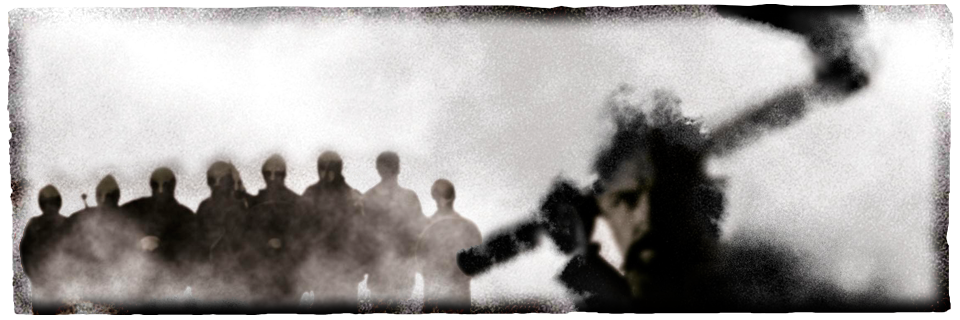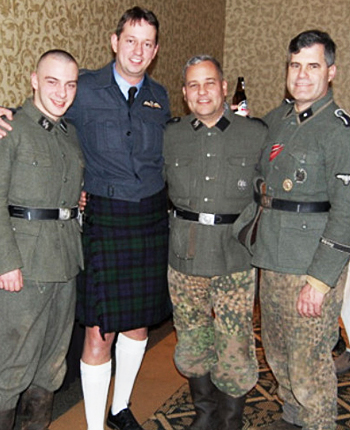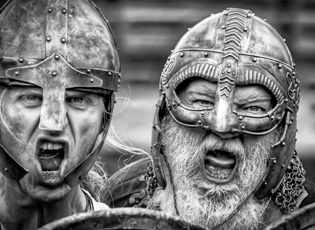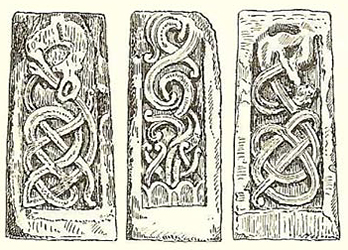
 home | about | blog | comments | Border Reivers |Brothers Of The Sand |Kingdom Series | Oathsworn Series
home | about | blog | comments | Border Reivers |Brothers Of The Sand |Kingdom Series | Oathsworn Series
<<More recent entries
 November 2010: Of mice and brains
November 2010: Of mice and brains
If proof were ever needed that the Americans are barking, it has to be the recent controversy over the hobby life of wannabe Congressman Rich Iott (pronounced like Idiot, only the 'd' is silent). In the spare time he has from being a politician he's a re-enactor who portrays, among other things, an SS officer of Division Wiking.
Senior Republican figures sought to distance themselves from Rich, who has been doing what he does for some years now, unsung and unremarked, and was bewildered and reduced to half-apologetically, half-defiantly stating that he did not mean "any disrespect to anyone" in the US military.
Rich – alias Reinhard Pferdmann, added: "Never, in any of my re-enacting of military history, have I meant any disrespect to anyone who served in our military or anyone who has been affected by the tragedy of war, especially the Jewish community.
"Historical re-enacting is a hobby enjoyed by millions of men and women around the world. I have been involved in historical re-enacting from many different eras since I was in college."
Tame historians popped up out of the woodwork for their five minutes of fame. Charles Sydnor, retired history professor who wrote a book about the SS Death's Head division and Professor Rob Citino, of the Military History Center at the University of North Texas, have been the most vociferous. No, I haven't heard of either of them before either.
Worringly, some of the 'historians' have not only had a go at Rich and his fellow SS Wiking re-enactors – but re-enactment in general. One or two have voiced the opinion that the pursuit is misinformed and non-historical; and at least one has asked the pertinent question: why don't they reenact US soldiers?
Well, of course, they do. From WWI, WWII, The US Civil War, the Vietnam War and even – a bit spookier and more unacceptable, to me at least, than Rich's SS predilections – some who reenact the US Marines in Iraq.
At least the uniforms and equipment are easier to get, I suppose, than the SS Wiking ones. Or the ones used by other WWII German forces re-enactors, some of whom I have shared a field with, and exchanged interesting conversations and fascinating facts.
You'll never see it on the glossy ads for perfume or sharp suits, but the reason the Nazis looked so good was that their uniforms were made by – Hugo Boss. Using forced labour from concentration camps.
But let's not forget that, like every story, there are two sides to a war – in some case, both sides included US soldiers. Do Confederate re-enactors offend black sensibilities by the same connotation that SS re-enactors offend the Jewish community? Does anyone try to prevent portrayals of Confederates? Let's see what southern Republican senators have to say about that.
And is it more acceptable to have folk dressing up as Norse Vikings, arch-pagan slaughterers of their day, than the SS butchers of the 20th century?
In others words – when is it right to airbrush history so that no-one is offended?
And I would rather have Rich Iott, uniformed and jackbooted and bewildered wee man that he is, on my dinner-guest list than the other guy in the picture from his website. Rich is the one second on the right – but who is the dork in a kilt and the top half of an RAF uniform? What is HE reenacting – His Majesty's Royal Scottish Flying Corps?
Even he is preferable, however, to the current crop of US Republicans – like the one who has questioned the civil rights legislation in the 1960s, or the one who admits to having dabblings in witchcraft, and also suggested that – try getting your head round this one… scientists were implanting full human brains into mice.
Or, in his case, vice versa.
These are the same Republicans who led the demands for Scotland's MSPs to travel to their offices to face a grilling over the Megrahi affair. Who demanded UK MPs turn up for a grilling over the BP oil spill. Who, in general, behave as if the entire world is an unruly classroom whose pupils must report the headmaster's office immediately.
Here's a tip for such characters: go forth and re-enact someone retiring from public life. Get a nice acceptable suit from Hugo Boss and find a new job using the skills accumulated over years in the US Senate. Banking, perhaps.
![]()
Well, there it is – Largs has celebrated its 30th anniversary Viking Festival and it is all over. The swords are sheathed, the sails are furled, the beer is drunk and the longship burned at what is the last show of the season for Glasgow Vikings and a fitting finale for the Oathsworn.
Last gasp of a frenetic year for me as regards the Vikings, with loads of re-enactment gigs in Norway, Sweden, Denmark and Canada, so I am glad to be able to take a breather.
However, Largs was unissable this year, not only because I live here and hardly have an excuse, byt because the paperback of The Prow Beast came out in August, marking the last act of four books detailing the adventures of Orm Bearslayer. Largs seemed an apt place for me to hoist a horn of mead to the lads – and move on.
Largs, you see, is set in 1263, scene of the battle which saw the sunset of the Vikings as they fled the Scottish mainland never to return. And, a mere thirty-four years later a charismatic leader led the Scots in rebellion – the age of Wallace had arrived, followed not long afterwards by the age of Bruce.
Currently, I am in the middle of editing the first of the three books I have planned on the Scottish Wars. Called The Lion Wakes, it covers the events of 1297 and ends just after the Battle of Falkirk.
Yet it appears – and thank you all for it – that fans of the Oathsworn are not ready to let the crew simply slip into the oblivion of history and, yes, I WILL return to them at some point in the future – once I have managed to get my head out of a bucket full of Bruce and Wallace.
More immediately, I am headed for Manchester in October (17th) to take part in the Historical Novel Society conference.
Hope to see some of you there, asking all the questions I know you have waiting for me.
![]()
August 2010: Memories of Gimli
Back from Gimli, Manitoba – spare a thought for that town of Icelandic ex-pats. They thought it was a good idea to name this New World enclave after the Old Norse for heaven – but who knew Tolkien would come along and force them to live up the rear-end of a grumpy dwarf?
For all that, the folk of Gimli are unfailingly cheerful and welcoming and I had a great time, both with the Canadian arm of the Vikings and the folk who came to listen to my lectures – though I suspect the latter had a great deal to do with the air-conditioned theatre and 36 degrees of humid heat.
My thanks to the Gimli Vikings, particularly the Sons of Fenrir (A-hoo) whose enthusiasm is like watching a Labrador with two tails and a juicy bone. To Warren and Nicole, my hosts for almost three weeks. To Fish, the only other Scot (though he now lives in Toronto) for joining in some decent Braid and having a laugh at the faces of the uncomprehending. To the giant dragonflies, for eating all the sodding mosquitoes which plagued our lives. To my wife, who has been abandoned for most of two months this year and put up with it with scarcely a murmur – I owe her Big Time. To many others, to numerous to mention.
The memories I take from it include:
The endlessly repeated ‘Welcome to the village’ speech, which is now engraved on the inside of my skull in fiery runes.
The sheer volume of enthusiastic visitors, none of them – it appears – Canadian. Those who weren’t Icelandic were Scots (though they had lived all their lives in Canada). If they had given me a dollar every time one announced direct descent from Wallace I would be extremely rich.
The warmth of everyone concerned, particularly the Vikings. They all wanted their copies of my books signed, laughed at my jokes and generally made me feel like a celeb, so that now I can’t wait to go back.
![]()
July 2010: Decades ahead in history
 I'm just back from a tour of Scandinavia which was a bit of an epic – five countries, four currencies and weather that wavered from blasting sunshine to howling blizzard. I am about to head off to Canada, so this blog is by way of a brief impression of some of the highlights – more pics and thoughts will appear later.
I'm just back from a tour of Scandinavia which was a bit of an epic – five countries, four currencies and weather that wavered from blasting sunshine to howling blizzard. I am about to head off to Canada, so this blog is by way of a brief impression of some of the highlights – more pics and thoughts will appear later.
The trip was a long, hard drive to Haugesund, starting – for me – with a drive to Harwich to catch the ferry with around 15 others and sundry vehicles. That took us to Denmark and we drove from there through Sweden into Norway, to the Viking encampment at Bukkoy in time for their annual Big Weekend. Then we drove all the way back again, with leisure to try a June snowfight in the mountains when ran into the unseasonal blizzard. We also visited some of the best Viking sites around – the Trelleborg forts, the recreated villages of Foteviken and Ribe, plus the museum and archaelogical dig at Jelling.
I was impressed by the archaeologists at Jelling, who had just uncovered a new Trelleborg fort thought to be the royal palace of Harald Bluetooth and were delighted to share the info and joy with a pile of English and one Scot. I am assured by the British bonekickers I know that this politeness is because, unlike their UK counterparts, they have state funding and bags of time. Still, it was refreshing.
I was also impressed by the Scandinavian kids. A strange mix – on the one hand, there are nine to twelve-year olds who seem to be like the ones I remember in my own childhood, still into cuddly toys and politeness. (British kids of the same age are wearing makeup, smoking, drinking, swearing and knifing each other.) On the other hand, they are not childish at all...
I am sitting in the longhouse after a night of gale and rain, watching my socks don’t burn on the open log fire, staring at the flames. There is a little eight year-old called Amelia, whom I met no more than an hour ago because she called out the only words of English she knew, ‘Santa Claus’, and made us both laugh. Now she climbs on to the bench beside me, takes a corner of my cloak and wraps it round her, then settles into the crook of my arm. We sit in companiable silence, listening to Gustav the skald tell Viking kid stories in Norwegian, which only she understands. Amelia’s parents are trying to sort out their flooded tent, so she has been left in the longhouse, in the care of perfect strangers. She picks up a stick, calls something to another perfect stranger, who hauls out a bloody great sharp knife and hands it to her without a word. Amelia starts to whittle a stick and no-one blinks an eye.
That would not happen here – none of it, for fear of what might happen to Amelia when she encountered knives, strangers with knives or strangers with Santa Claus beards.
Another for instance – I am in Roskilde, which is a ship museum and a huge teaching aid for schools. A bunch of kids are taking part in a fun seminar by the resident woodcrafter, who is showing them how the Vikings could make parts for their ships using only a stick and an axe. She hands out sticks and axes and the kids set to, while I am hearing every Health and Safety officer I have ever known have a coronary.
The realization comes to me only later: these kids are brought up carefully and without fear. I arrive back in the UK to kids either shepherded everywhere by their worried parents, or left to run feral; and I mourn.
Other positive impressions include the working recreation of Ribe, the Buck House of Viking re-enactment, complete with farmed crops, livestock and the longest, most breathtaking longhouse I have ever seen.
I know that this is the heritage of the Scandinavians – but how come they are funded to make this, keep it and get the volunteers to staff it when this country can’t do anything like it for any historical age it considers its heritage?
![]()
Normally, I couldn’t give tinker’s for Niall Ferguson, telegenic presenter of financial histories, serial grump and author of such gripping yarns as Paper and Iron: Hamburg Business, German Politics in the Era of Inflation, 1897–1927 and Empire: The Rise and Demise of the British World Order and the Lessons for Global Power. Catchy – though I am sure they are page-turners for readers of the Financial Times.
Never met the man, probably would find him a decent dinner companion, but he comes to the feast with a couple of flaws which I might have to battle to get over.
One is my own prejudice – he is educated at posh Glasgow Academy and Oxford and now teaches at Harvard. I have met a few similarly blessed academics in my time and almost every one has been a tosser. However, this is only a small personal sample and I am sure if I widened my experience of them I would be reassured.
The other is that he is that worst of all clever men – an arrogant argument waiting to happen. He has a brilliant non-objective idea and it becomes a truth that will not suffer contradiction. He has argued with financial experts here and in the US, historians worldwide, and his wife presumably, since he has moved out of the marital home and now has a glamorous Somali on his arm.
Recently we found him pontificating at the Hay on Wye festival. It seems he no longer reads historical fiction because such works 'contaminate historical understanding'. Likewise he warns against historians inferring beyond the written record 'or else this takes you into the realm of romantic fiction, a world I shall never enter.'
Well, we've been here before. Tom Devine v wee Neil Oliver. David Starkey v everyone who doesn’t think Henry VIII is the centre of the universe.
Ferguson, though, is the sort you want to shout at to ‘gie’s peace, ya wee nyaff’. Not because he is talking total pish, but because he does it like a drunk in a Glasgow pub, stumbling over everyone’s feet and accusing them of spilling his pint. It does not help that he has that smug ba’ face which is so Glasgow and so frequently smacked.
But let’s consider only his most recent point. Is this the Ferguson who wrote The Pity of War (modestly subtitled Explaining World War One) and packed it full of enough ‘what-ifs’ to make Harry Turtledove blush? Who reached the conclusion, as a result, that Britain should never have fought in it, allowing Germany to win? Who champions ‘counterfactual history’? Which is different from revisionist or alternate history – how?
The Pity is the only one of his books I have been prompted to read, simply because it had some of the best fiction ideas since Winston Churchill put forward the possible result of Robert E. Lee winning at Gettysburg. I guarantee someone will have snaffled the basic premise of The Pity Of War in a couple of years and used it as the basis of a rollicking good Dan Brown yarn.
It might even, I suspect, be Niall Ferguson himself. I mean, what is ‘counterfactual history’? Could it be – careful now... historical fiction?
![]()
Most writers struggle with their craft in silence – but not Hunter Steele, author and publisher. He and his wife have launched a legal action against a building firm responsible for "clouding his intellect" by keeping a generator switched on overnight, adjacent to his home in Errol, Perthshire, for nearly five months.
The former creative writing teacher at the University and Glasgow, who has several novels to his name, is seeking compensation of £5000, after telling a court that the low rumble of the machine prevented him from "composing new text of originality and value".
"I am an author and publisher," Mr Steele, 60, added in his court writ. "I require a clear head, unclouded intellect to compose text of originality and value.”
I don’t normally have a pop at other writers – the profession is hard enough without dog eating dog. But still… Hunter Steele lists sleep deprivation, chronic fatigue, depression, headaches, dizziness, a racing heartbeat and nausea – my God, it is a wonder the man only wants five grand. Within three months he had to change his working practices to cope, with he and his partner spending hours double-checking each other's work.
Which raises the question: why did he wait five months? Had I been suffering this badly, I would have sabotaged the bloody generator if it hadn’t been switched off by Day Two. I can’t have the Oathsworn woolly-minded, by Odin!
And, please, give me a break about ‘clouded judgment’ and the inability to create anything meaningful with the background noise equivalent of an idling taxi. Tell it to the Great War poets. Tell it, even, to JK Rowling, who did the first Harry Potter book in a public cafe, ringing till, slurping lattes, the lot. Even I have managed to compose the author’s note for The White Raven on a stop-start train journey from London, with two quarrelling weans in the next window seat.
But he is right – there are times when words just fail you. This is one of them.
Meanwhile, in another part of the forest – Nick Evered bought a house in Peterborough which had once been a hermitage. It came with a daud of old carved stone, pictured above. After eight years Nick decided to to sell it and made arrangements through Bonhams. The auction house experts were delighted to reveal it as Anglo-Saxon, a carving devoted to the first female hermit, St Pega, whose hermitage, circa 716AD, was the site of Nick’s home.
So what is the Peakirk Cross, as it is known, doing in a saleroom, from where it could vanish anywhere in the world – even disappear from public view? Bonhams established it was not part of the listed building, which would have prevented the sale. The Treasure Act is resolute when it comes to all the glitter of the Anglo-Saxon Staffordshire hoard… but does not care a jot for slab of limestone.
The stone had a guide price of £7000 to £9000 before the Church of England warned Bonhams: "We consider the legal status of this piece to be unclear" and it was removed from its scheduled auction. No one has said whether a sale was completed or what will happen to the Peakirk Cross next. So much for the Viking belief that things written in stone were valued enough to be venerated – watch out for the old carved cross near you.
Lastly, it seems the Oathsworn are crossing boundaries in more ways than one. Despite having no sorcery, only swords, they have become doyens of the fantasy world and I am quietly delighted. Thanks for the nice thoughts, Conan guys.
You can find previous blog entries in the old website archive.


